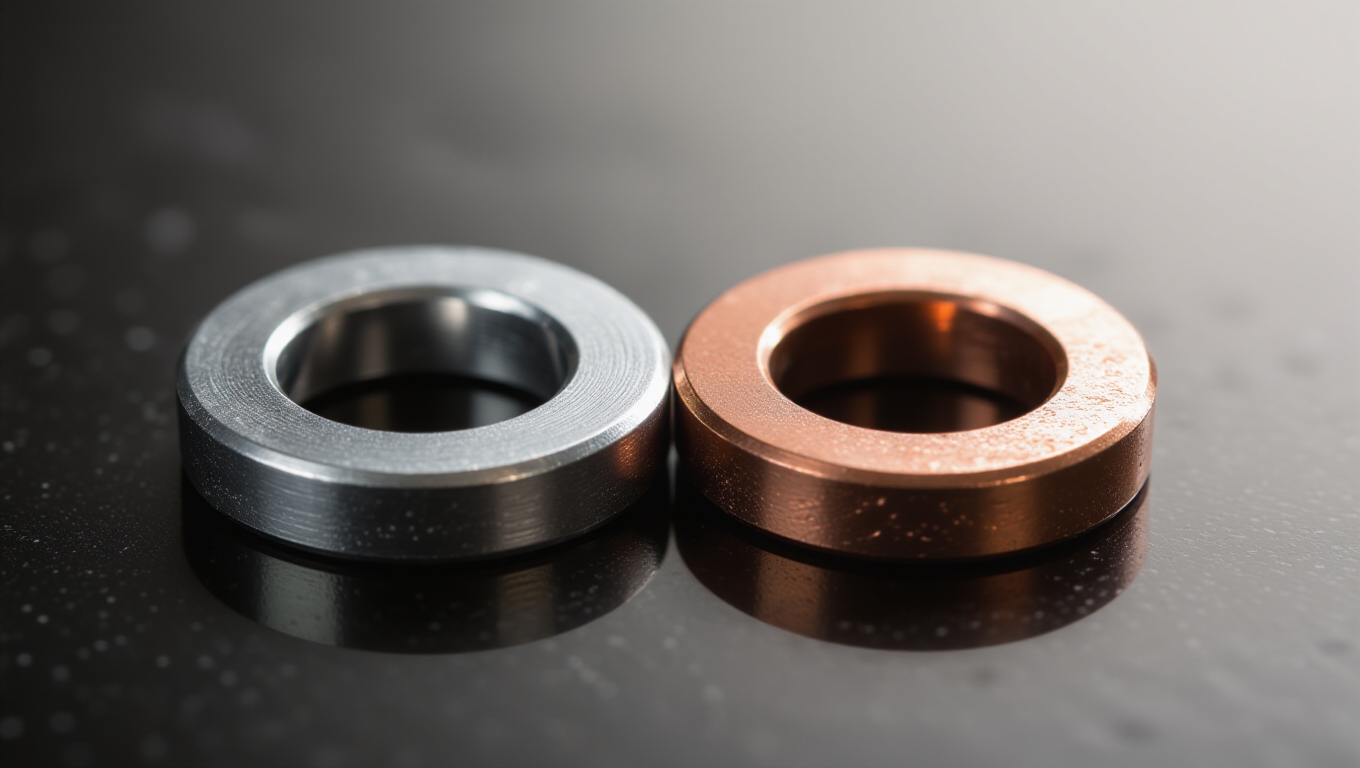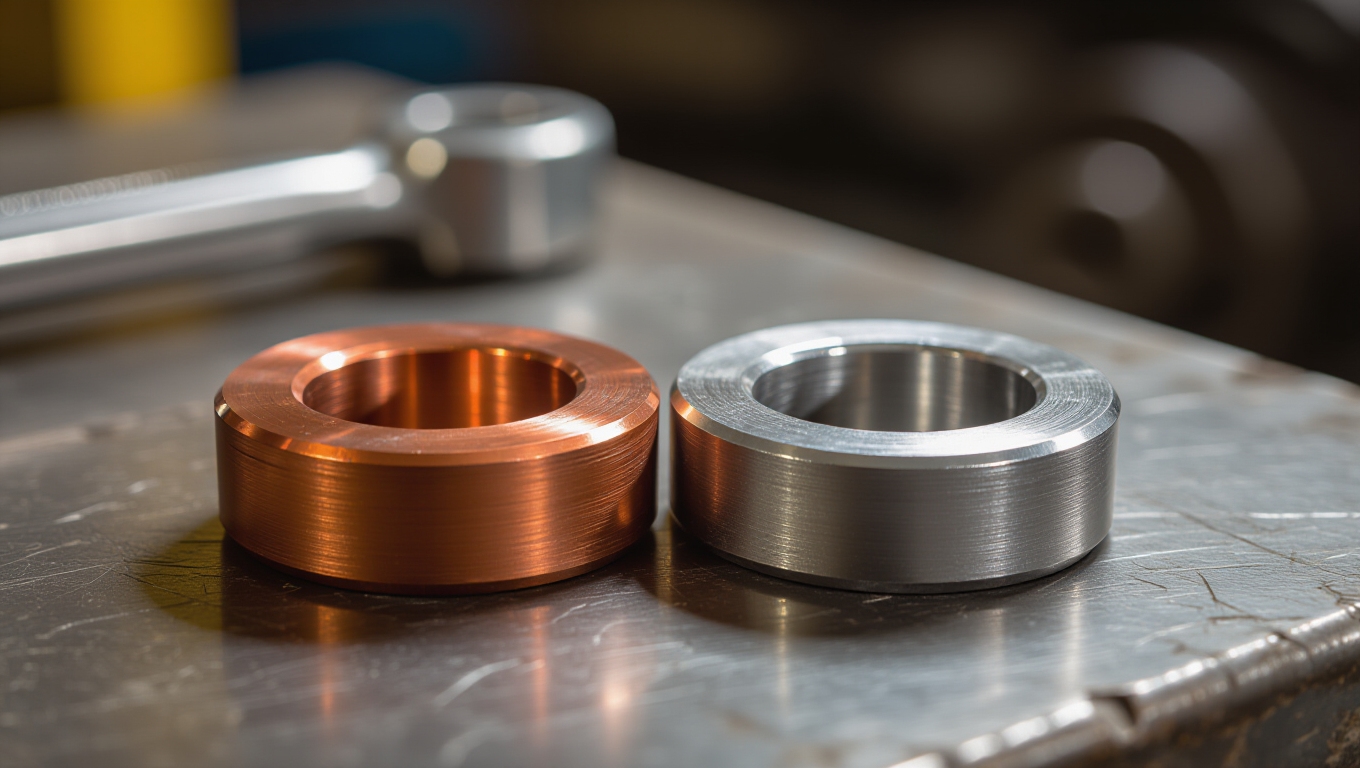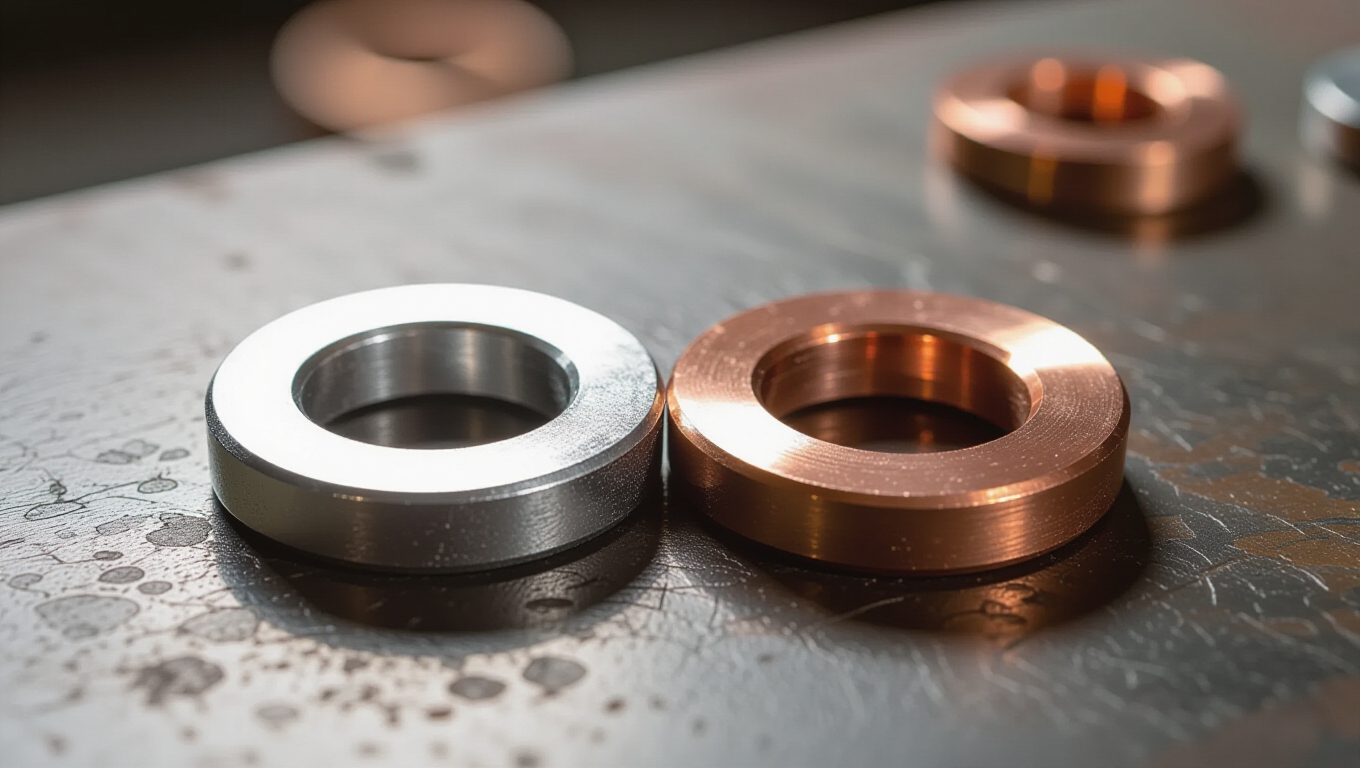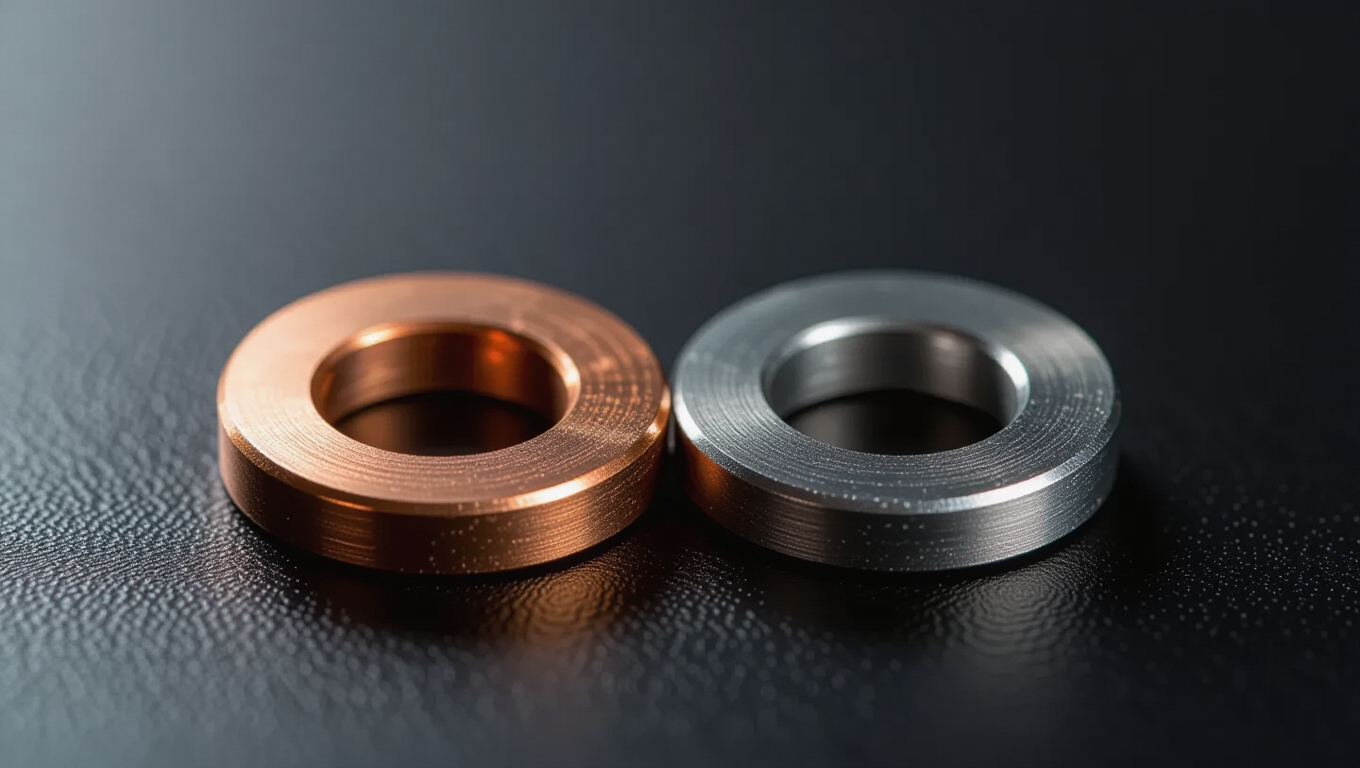You’ll find copper crush washers outperform aluminum in strength, durability, and high-temperature resistance, making them ideal for high-pressure applications like fuel or brake systems. Aluminum washers weigh less and resist mild corrosion but deform easier and suit lighter-duty uses. Copper offers better sealing, malleability, and longevity despite higher cost. Choosing between them depends on your system’s pressure, environmental factors, and durability needs. Exploring further reveals detailed mechanical, environmental, and cost considerations to guide your selection.
Key Takeaways
- Copper crush washers offer superior mechanical strength and durability, suitable for high-pressure and high-temperature applications.
- Aluminum washers are lighter and more flexible, ideal for moderate sealing and low-weight uses.
- Copper resists high temperatures and maintains seal integrity better than aluminum under extreme conditions.
- Aluminum forms a protective oxide layer, excelling in mildly corrosive environments but is prone to deformation.
- Copper washers cost more upfront but last longer, while aluminum washers are cheaper but may require frequent replacement.
Material Properties and Performance Comparison

When comparing aluminum and copper washers, you’ll find that copper outperforms aluminum in mechanical strength and durability, making it the preferred choice for heavy-duty, high-pressure applications.
Copper crush washers exhibit higher shear and tensile strength, enabling better performance under repeated torque and mechanical stress. Their superior hardness ensures longer service life and structural integrity in rugged conditions.
Additionally, copper’s high-temperature resistance allows it to maintain sealing effectiveness in extreme heat environments. This durability is akin to how bevel gears manage high axial and radial forces in demanding mechanical settings.
Conversely, aluminum washers have lower mechanical strength, are more prone to deformation, and therefore better suited for lighter-duty uses where flexibility and reduced weight are priorities. While aluminum’s low density benefits mass-sensitive industries like aerospace, copper’s robustness and resistance to mechanical fatigue make it indispensable when reliability under stress is critical.
Your choice depends on balancing these material properties against the operational demands.
Corrosion Resistance and Environmental Impact
Although both aluminum and copper washers offer corrosion resistance, their effectiveness varies markedly depending on environmental conditions and chemical exposures. Aluminum forms a protective oxide layer, excelling in neutral or mildly corrosive environments, especially outdoors.
Made from high-quality aluminium for sealing applications, aluminum crush washers are commonly used in automotive braking, fuel, and oil systems. Their corrosion resistance performance can be influenced by the specific chemical environment they encounter.
Copper resists harsh chemicals and extreme temperatures but oxidizes in humid conditions, developing a green patina. You should note that galvanic corrosion may occur if copper washers contact aluminum parts in electrolyte presence, accelerating aluminum degradation.
Regarding environmental impact, aluminum production consumes more energy and emits higher carbon but generates fewer toxic byproducts and is highly recyclable. Copper’s mining is environmentally intensive, though its recyclability preserves properties and reduces waste.
Selecting washers requires balancing corrosion resistance with environmental considerations, factoring in exposure conditions and long-term sustainability.
Application Suitability and Functional Differences

Since your application demands vary widely, choosing between aluminum and copper washers hinges on their distinct sealing capabilities and functional traits. Copper washers excel under high pressure and temperature, providing durable seals in fuel and brake systems due to superior malleability and thermal conductivity.
Their high resistance to corrosion and oxidation further enhances longevity in harsh environments. This makes copper washers a preferred choice for high-performance applications where reliability is critical.
Aluminum washers favor moderate sealing needs where corrosion resistance, lightweight, and oxidation protection matter, common in marine or outdoor settings. They are made from a soft, malleable material that compresses to fill gaps and prevent leaks effectively.
Consider these key points:
- Pressure and Sealing: Copper suits fluctuating, high-pressure environments; aluminum handles moderate pressure with corrosion resistance.
- Electrical and Thermal Conductivity: Copper offers excellent electrical and heat conduction; aluminum lacks these but resists magnetic interference.
- Weight and Environment: Aluminum’s lightness benefits aerospace and moisture-exposed uses; copper’s weight supports durability in demanding systems.
Align washer choice with your system’s pressure, electrical, and environmental priorities for ideal performance.
Mechanical Behavior and Installation Tips
Selecting between aluminum and copper washers requires a clear understanding of their mechanical behaviors and installation demands.
Copper washers offer higher hardness (~370 MPa Vickers) and tensile strength, enabling secure seals with less torque and reducing retorquing needs. Their malleability allows deformation without damage, supporting occasional reuse if annealed.
Additionally, copper’s superior mechanical strength makes it ideal for heavy-duty, high-pressure sealing applications. Proper maintenance and inspection can further enhance the reliability of copper washers in demanding environments, similar to how serviceable ball joints extend component life in other mechanical systems.
Copper washers combine hardness and malleability for strong seals with minimal torque and potential for reuse.
Aluminum washers, with lower hardness (~167 MPa), deform easily but risk galling and surface damage, demanding higher torque and pristine mating surfaces to avoid leaks. They’re typically single-use due to poor elastic recovery and vulnerability to cracking if over-torqued.
When installing, prioritize smooth surfaces for aluminum and moderate torque for copper to prevent failure. Understanding these mechanical traits ensures superior sealing performance and longevity in your specific application.
Cost Factors and Industry Usage Trends

When evaluating aluminum versus copper crush washers, understanding cost factors and industry usage trends is crucial for making informed decisions. Aluminum washers cost less upfront due to cheaper raw materials and simpler manufacturing, but they often require more frequent replacement.
This is partly because aluminum’s corrosion resistance helps prevent deterioration, yet its lower durability can limit lifespan. Additionally, the temperature tolerances of aluminum washers can influence their suitability in certain applications.
Copper washers have higher initial costs and price volatility but offer superior sealing, reusability, and durability, lowering long-term expenses.
Industry preferences reflect these trade-offs:
- Automotive sectors favor aluminum for lightweight, cost-effective oil drain plugs.
- Hydraulic and fuel systems rely on copper for high-temperature, high-pressure sealing.
- Aftermarket users prefer copper washers’ reusability, balancing cost over time.
You should weigh upfront cost against lifecycle performance and application demands to optimize your choice between aluminum and copper crush washers.
Frequently Asked Questions
Can Aluminum and Copper Crush Washers Be Mixed in the Same Assembly?
You shouldn’t mix aluminum and copper crush washers in the same assembly because their differing hardness and deformation characteristics affect sealing performance.
Aluminum washers deform more easily, ensuring a tight seal on aluminum surfaces. Copper washers are harder and better suited for steel parts.
Combining them risks uneven compression, possible leaks, and accelerated wear, especially on softer aluminum components.
To maintain seal integrity and prevent damage, always match the washer material to the mating surfaces.
How Do Temperature Fluctuations Affect the Lifespan of Each Washer Type?
Isn’t it ironic that temperature swings can be a washer’s worst enemy? You’ll find copper excels under thermal cycling thanks to its toughness and resistance to expansion fatigue, preserving its lifespan impressively.
Aluminum, however, struggles—its softness means it deforms and cracks from repeated heat stress, shortening durability.
Are There Specific Industries That Exclusively Prefer One Material Over the Other?
You’ll find that engine and electrical industries exclusively prefer copper washers for their superior thermal and electrical conductivity.
Aerospace and marine sectors, however, lean heavily on aluminum washers due to their lightweight and corrosion resistance.
Manufacturing environments aiming for cost-efficiency typically choose aluminum, while high-pressure industrial applications demand copper’s durability.
What Recycling Options Exist for Used Aluminum Versus Copper Crush Washers?
Picture your greasy washers as tiny metal superheroes—aluminum, the lightweight champion, accepted widely and recycled with less energy, and copper, the dense, valuable contender demanding pricier cleanup.
You’ll clean off oils, sort meticulously, then deliver them to scrap yards or specialized recyclers.
Aluminum washers recycle easily into new products, while copper commands higher payouts but may need extra refining.
Both recycle infinitely, so recycling beats hoarding your metal sidekicks!
How Do Washer Thicknesses Vary Between Aluminum and Copper Options?
You’ll notice aluminum crush washers typically measure around 1.4 to 1.5 mm thick, designed to deform easily under lower torque.
Copper washers, however, often range from 1.5 to 1.7 mm, compensating for copper’s higher hardness to guarantee proper sealing.
This thickness difference balances aluminum’s flexibility with copper’s durability, letting you select washers that suit your torque and sealing requirements precisely.
Match Your Crush Washer to Your Needs
When choosing between aluminum and copper crush washers, remember that copper offers up to 50% better corrosion resistance, making it ideal for harsh environments. However, aluminum’s lightweight nature suits applications where weight reduction is critical. Understanding these material properties helps you select the right washer for performance and longevity. Keep in mind installation techniques differ—proper torque guarantees a reliable seal regardless of your choice, balancing cost and durability effectively in your specific use case.









